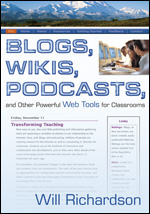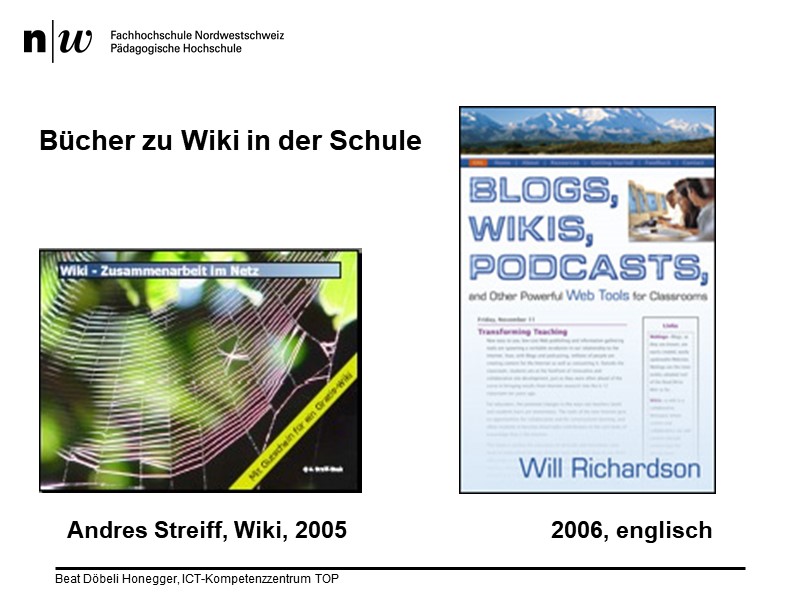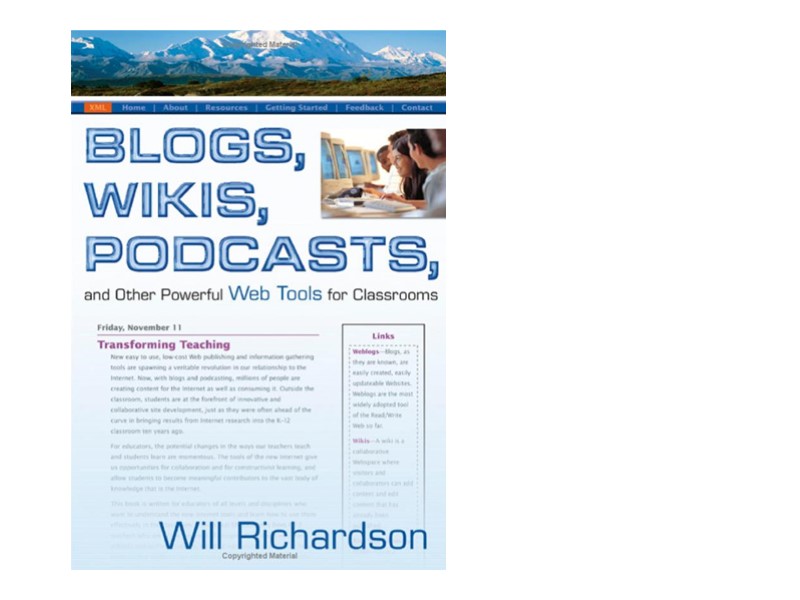Blogs, Wikis, Podcasts, and Other Powerful Web Tools for Classrooms |

|
 Diese Seite wurde seit 6 Jahren inhaltlich nicht mehr aktualisiert.
Unter Umständen ist sie nicht mehr aktuell.
Diese Seite wurde seit 6 Jahren inhaltlich nicht mehr aktualisiert.
Unter Umständen ist sie nicht mehr aktuell.
 Empfehlungen
Empfehlungen
Conclusion: this is a great guide for those who have yet to start with social software. It is an easy read and provides many examples that make you eager to get started. The advanced social software user will of course see much familiar stuff, but this target group also has much to gain, especially from the last chapter which clearly details the meaning of social software for education. The extensive focus on information skills is also positively remarkable.
Von Sybilla Poortman, erfasst im Biblionetz am 11.11.2006 Zusammenfassungen
Zusammenfassungen
 This may look like a book about technology, but it's really a book about the connections, collaborations, and conversations that the new "cool tools" of the Web are allowing us to create. It is less about blogs and wikis and podcasts than it is about the educators behind them who are using them so creatively to motivate students to learn more deeply and contribute what they know to the amazing body of knowledge that is the World Wide Web. And the best part of it is that very few of these educators have any great technology skills. More, they have ideas and vision of what easy publication tools might do in their classrooms.
This may look like a book about technology, but it's really a book about the connections, collaborations, and conversations that the new "cool tools" of the Web are allowing us to create. It is less about blogs and wikis and podcasts than it is about the educators behind them who are using them so creatively to motivate students to learn more deeply and contribute what they know to the amazing body of knowledge that is the World Wide Web. And the best part of it is that very few of these educators have any great technology skills. More, they have ideas and vision of what easy publication tools might do in their classrooms. This book has three main goals.
This book has three main goals. - First, I hope to give educators some context in terms of what these technologies mean f or our society as well as for education. More than anything eise, the fact that the new Interactive Web is weaving so many drastic changes in Journalism, business, and politics convinces me that its effects on education will be equallv transformational.
- Second, this book aspires to challenge and motivate teachers to think differently about their classrooms and the potentials of the technologies discussed in terms of pedagogy and curriculum.
- And finally, l hope to snare enough of the "how-to"needed to get teachers started using these tools right away. Luckily, the barriers to entry to Publishing to the Web have come way down.
 Discover how to harness Web tools to motivate and update student reading, research and communication!
This book brings teachers a bold vision and on-the-ground Monday morning practicality. It will move educators to think differently about technology’s potential for strengthening students' critical thinking, writing, reflection, and interactive learning. Will Richardson demystifies words like "blog," "wiki," and "aggregator" making classroom technology an easily accessible component of classroom research, writing, and learning.
This guide demonstrates how Web tools can generate exciting new learning formats, and explains how to apply these tools in the classroom to engage all students in a new world of synchronous information feeds and interactive learning. With detailed, simple explanations, definitions and how-tos, critical information on Internet safety, and helpful links, this exciting book opens an immense toolbox, with specific teaching applications for
Discover how to harness Web tools to motivate and update student reading, research and communication!
This book brings teachers a bold vision and on-the-ground Monday morning practicality. It will move educators to think differently about technology’s potential for strengthening students' critical thinking, writing, reflection, and interactive learning. Will Richardson demystifies words like "blog," "wiki," and "aggregator" making classroom technology an easily accessible component of classroom research, writing, and learning.
This guide demonstrates how Web tools can generate exciting new learning formats, and explains how to apply these tools in the classroom to engage all students in a new world of synchronous information feeds and interactive learning. With detailed, simple explanations, definitions and how-tos, critical information on Internet safety, and helpful links, this exciting book opens an immense toolbox, with specific teaching applications for
- Web logs, the most widely adopted tool of the read/write Web
- Wikis, a collaborative Webspace for sharing published content
- Rich Site Summary (RSS), feeding specific content into the classroom
- Aggregators, collecting content generated via the RSS feed
- Social bookmarking, archiving specific Web addresses
- Online photo galleries
 Bemerkungen zu diesem Buch
Bemerkungen zu diesem Buch
As the information in the book’s examples is quickly outdated it is a pity that this title has not been published online. Apart from that it is absolutely recommended.
Von Sybilla Poortman, erfasst im Biblionetz am 11.11.2006 Kapitel
Kapitel 
- Preface
- 1. The Read/Write Web
- 2. Weblogs: Pedagogy and Practice
- 3. Weblogs: Get Started!
- 4. Wikis: Easy Collaboration for All
- 5. RSS: The New Killer App for Educators
- 6. The Social Web: Learning Together
- 7. Fun with Flickr - Creating, Publishing and Using Images Online
- 8. Podcasting and Screencasting - Multimedia Publishing for the Masses
- 9. What It All Means
- 10. Epilogue: The Classroom of the Read/Write Web
 Dieses Buch erwähnt ...
Dieses Buch erwähnt ...
 Dieses Buch erwähnt vermutlich nicht ...
Dieses Buch erwähnt vermutlich nicht ... 
 Nicht erwähnte Begriffe | Bildung, Computer, Digitalisierung, E-Mail, Kinder, LehrerIn, MediaWiki, openBC / Xing, Primarschule (1-6) / Grundschule (1-4), Schule im Netz (PPP-SiN) (Schweiz), Schulen ans Netz (Deutschland), Schweiz, Trackback, Unterricht |
 Tagcloud
Tagcloud
 2 Vorträge von Beat mit Bezug
2 Vorträge von Beat mit Bezug
 2 Einträge in Beats Blog
2 Einträge in Beats Blog
 Zitationsgraph
Zitationsgraph
 Zitationsgraph (Beta-Test mit vis.js)
Zitationsgraph (Beta-Test mit vis.js)
 Zeitleiste
Zeitleiste
 21 Erwähnungen
21 Erwähnungen 
- Using Wikis for Collaborative Learning - a Case Study of an Undergraduate Students’ Group Project in Hong Kong (Kevin Leung, Samuel Kai Wah Chu)


- Knowing Knowledge (George Siemens) (2006)


- Open Educational Practices and Resources - OLCOS Roadmap 2012 (Guntram Geser) (2007)


- Ne(x)t Generation Learning - SCIL-Arbeitsbericht 12 (Sabine Seufert, Taiga Brahm) (2007)



- WikiWiki - Technische Grundlagen und pädagogisches Potential (Taiga Brahm)
- Wikis in the College Classroom - A Comparative Study of Online and Face-to-Face Group Collaboration at a Private Liberal Arts University. (James E. Coyle) (2007)


- Open Educational Practices and Resources - The Key Role of Social Software (Guntram Geser) (2007)

- WikiSym 2007 (2007)
- Building Collaborative Capacities in Learners - The M/Cyclopedia Project, Revisited (Axel Bruns, Sal Humphreys)


- Building Collaborative Capacities in Learners - The M/Cyclopedia Project, Revisited (Axel Bruns, Sal Humphreys)
- Apple Classrooms of Tomorrow - Today - Learning in the 21st Century (Apple) (2008)


- Using wikis to enhance and develop writing skills among secondary school students in Hong Kong (Barley Mak, David Coniam) (2008)


- A systemic and cognitive view on collaborative knowledge building with wikis (Ulrike Creß, Joachim Kimmerle) (2008)


- LOG IN 152: Web 2.0 in der Schule (2008)


- Wikis im Deutschunterricht und anderswo - Ein Bericht aus der Unterrichtspraxis mit Anregungen für die Unterrichtspraxis (Uwe Klemm)

- Wikis im Deutschunterricht und anderswo - Ein Bericht aus der Unterrichtspraxis mit Anregungen für die Unterrichtspraxis (Uwe Klemm)
- The good, the bad and the wiki - Evaluating student-generated content for collaborative learning (Steeve Wheeler, Peter Yeomans, Dawn Wheeler) (2008)


- Social negotiations in a wiki environment - a case study with pre-service teachers (Vetta Vratulis, Teresa Dobson) (2008)


- Looking Toward the Future of Technology-Enhanced Education (Martin Ebner, Mandy Schiefner) (2009)

- Hybrid dialog - Dialogic learning in large lecture classes (Tobias Zimmermann, Karen-Lynn Bucher, Daniel Hurtado) (2010)


- Curriculum 21 - Essential Education for a Changing World (2010)


- Wiki Supporting Formal and Informal Learning (Stefania Bocconi, G. Trentin) (2012)
- Technology enhanced collaborative learning in projects - Dimensions of knowledge building: student’s activity, collaboration and communication (Michele Notari) (2012)

- Der Wiki-Weg des Lernens - Gestalten und Begleiten von Lernprozessen mit digitalen Kollaborationswerkzeugen (Michele Notari, Beat Döbeli Honegger) (2013)



- 4. Mit einem Wiki zusammenarbeiten, aber wie? (2013)


- 11. Verwendung von Wikis zum kollaborativen Lernen in Grundschulen (Samuel Kai Wah) (2013)


- 4. Mit einem Wiki zusammenarbeiten, aber wie? (2013)
 Co-zitierte Bücher
Co-zitierte Bücher
 Volltext dieses Dokuments
Volltext dieses Dokuments
 | Blogs, Wikis, Podcasts, and Other Powerful Web Tools for Classrooms: Gesamtes Buch als Volltext ( : :  , 6870 kByte) , 6870 kByte) |
 Standorte
Standorte 
 Bibliographisches
Bibliographisches 
| Titel | Format | Bez. | Aufl. | Jahr | ISBN | ||||||
| Blogs, Wikis, Podcasts, and Other Powerful Web Tools for Classrooms | E | Paperback | - | 1 | 2006 | 1412927676 |  |
 |
 |
 |
 |
| Blogs, Wikis, Podcasts, and Other Powerful Web Tools for Classrooms | E | Gebunden | - | 1 | 2006 | 1412927668 |  |
 |
 |
 |
 Beat und dieses Buch
Beat und dieses Buch
Beat war Co-Leiter des ICT-Kompetenzzentrums TOP während er dieses Buch ins Biblionetz aufgenommen hat. Die bisher letzte Bearbeitung erfolgte während seiner Zeit am Institut für Medien und Schule. Beat besitzt ein physisches und ein digitales Exemplar. (das er aber aus Urheberrechtsgründen nicht einfach weitergeben darf). Beat hat dieses Buch auch schon in Vorträgen sowie in Blogpostings erwähnt.








 Anonymität
Anonymität Copyright
Copyright creative commons
creative commons Internet
Internet Lernen
Lernen Multimedia
Multimedia Podcast
Podcast Privatsphäre
Privatsphäre RSS
RSS Schule
Schule Weblogs
Weblogs Wikipedia
Wikipedia Wissen
Wissen WWW (World Wide Web)
WWW (World Wide Web)











 Biblionetz-History
Biblionetz-History